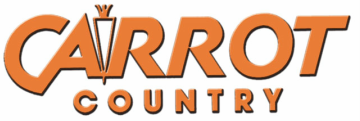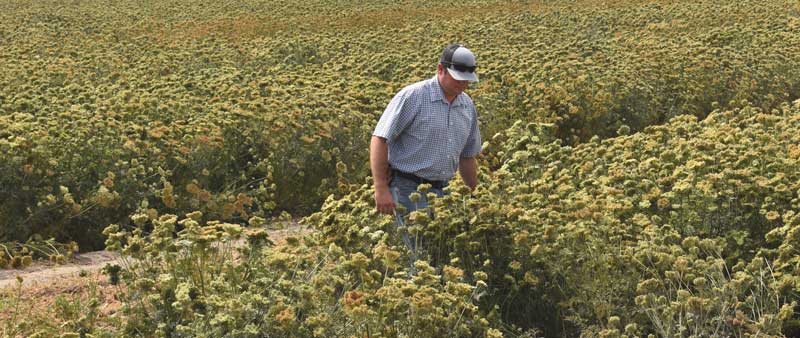Story and photos by Dave Alexander, Publisher
Whenever possible, Eric Jemmett and his partners with J&S Farms Inc. in Parma, Idaho, take things “to the max.” He looks to maximize production methods, yields and profits and has found a unique way to add to the farm’s bottom line. In addition to growing several different crops including 120 acres of carrot seed last year, Jemmett is also a trained and operating contract researcher.
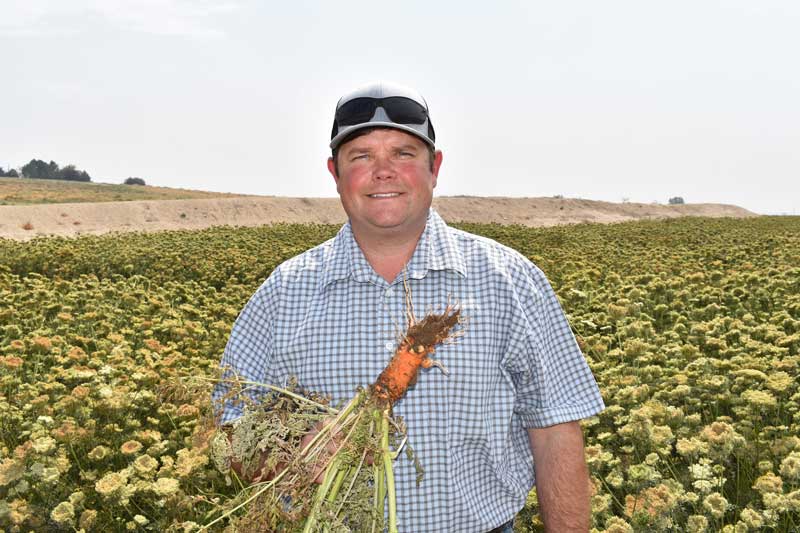
Maximizing Carrot Seed
Grown on a Nunhems contract, J&S Farms’ carrot seed crop is produced with two miles of isolation between plots. The need for isolation means the Jemmetts have to spread out their operation. Last year, they had seed plots in several spots, making their operation a 30-minute drive end to end.
The farm produces seed by two methods: seed-to-seed and root-to-seed.
The seed-to-seed crop is planted in August and harvested 13 months later. Planning is done in July so that Jemmett knows how many acres to set aside for August planting. The carrots only grow to about 0.5 inch in diameter before winter. The next spring, the crop will bolt and senescence and start producing flowers.
The root-to-seed crop is planted in March or April. Each root is planted by hand in a machine-dug trench. Harvest is around mid-September of the same year. Jemmett says it is always a problem finding enough labor to do the hand planting.
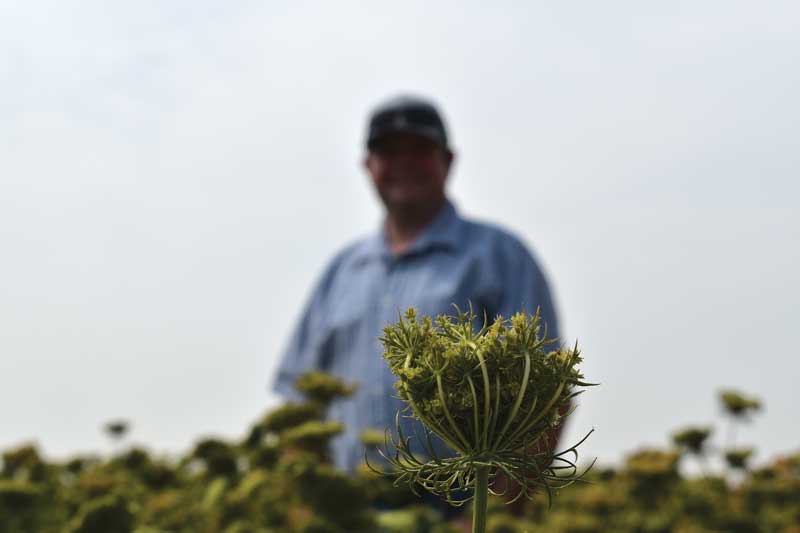
Maximum Challenges
Finding enough labor is an issue Jemmett shares with most growers. Luckily, the farm has a small but stable crew every year, many of the workers now in their 60s and 70s. Hiring local younger seasonal workers is not working out well, though.
“We’re not difficult to work for, but these people did not want to work. They didn’t fulfill their work contract. They had to be let go,” Jemmett says.
During harvest, J&S Farms uses a “one-for-all, all-for-one” approach. Eric’s brothers Michael and Brian and his cousin Jarom are co-owners of the farm and all pitch in.
COVID-19 wrecked work schedules in 2020. Many people tested positive for the virus during the summer, but the farm was able to maintain a safe working environment, Jemmett says.
The farm has turned to the H-2A program, which has brought much needed stability to the workforce. These workers are more dependable and consistently do a good job, the grower says.
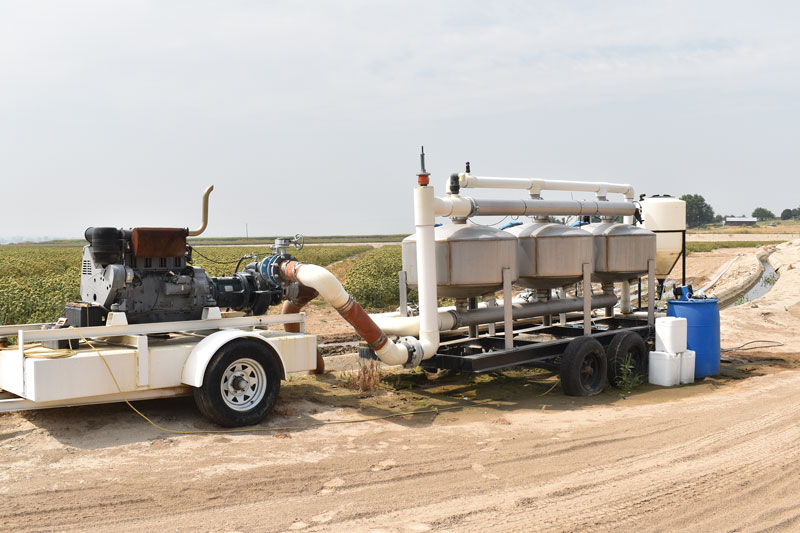
Maximizing Resources
“Raising carrot seed takes experience and attention to detail,” Jemmett says.
One of the things he has learned is that drip irrigation on carrot seed provides higher quality and less disease. Two rows of carrots are allotted for each drip tape.
But using drip tape presents its own challenges. To keep the tape from getting clogged, the Jemmetts designed their own portable irrigation systems. Built by Clearwater Supply, the portable systems use a pump that brings dirty canal water into tanks that then runs through a mixture of sand and gravel, filtering large particles. The water is filtered again, down to 200 microns, yielding clean water for the drip tape. The pump systems feature computerized backflow prevention to clean out filters and are capable of chemical injection. Though vital to a healthy crop, Jemmett says the drip system costs about $500 per acre to install and maintain.
“The only money it’s going to bring you is if you reduce the amount of disease,” he says.
It’s diseases like powdery mildew and Rhizoctonia that are hard for Jemmett to control. Every year, bees are brought in to pollinate the seed crop. Beekeepers do not want insecticides or fungicides applied until after pollination when the bees are removed.
“By the time we pull the bees out, we’re already at a negative point and trying to play catch up on the diseases and the insects,” Jemmett says.
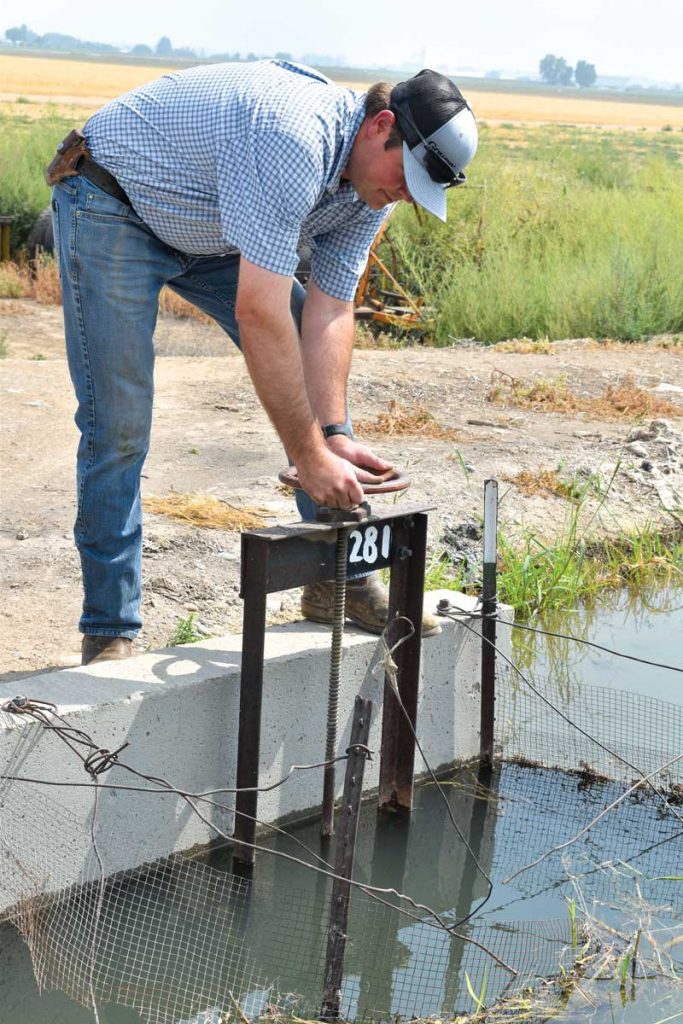
Maximizing Profit
Jemmett has always been interested in research. While working toward his ag science and technology degree at Brigham Young University-Idaho, he got to know researchers and studied research techniques. Even before he finished his master’s degree at the University of Idaho, he realized that contract research could be incorporated in the farm.
“We had the ground and many crops, and I thought this will work well in conjunction with our farm,” he recalls.
He saw that universities were being overrun with research requests and recognized that they only have limited space for trials. In addition, chemical companies often have new products with unknown efficacy that they may not yet want to include in published trials.
With this knowledge in hand, he created Jemmett Consulting and Research, which he also manages. The contract research has allowed J&S to use the farm’s existing acreage to make more money per acre.
Jemmett says it takes a while to get established, though, because trust must be earned from potential clients. He does crop research on a majority of the crops grown in the Treasure Valley, including carrots, onions, potatoes, wheat, dry beans, corn, sugar beets, hay, mint and hops, for many agriculture companies including Gowan, Bayer, Syngenta and Corteva.
Trial plots are set into production fields, giving Jemmett a research niche and real-world results, which his clients appreciate. This unique approach allows J&S Farms to maximize profits.
